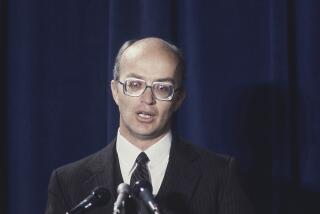The Cleanup Man
WASHINGTON — When Richard J. Daley was sworn in as mayor of Chicago in April 1955, the next day’s newspaper carried a hastily posed portrait of the new mayor and his family. His youngest son, Billy, then 7, was standing off to the side, almost out of sight.
That would be the Bill Daley persona for years to come: a behind-the-scenes man, helping politicians of all stripes, but never holding office himself.
Now 48, after a low-profile career as a back-room strategist, corporate lobbyist, high-priced lawyer and Democratic party fund-raiser, a matured William M. Daley is finally stepping into the limelight on his own as President Clinton’s new secretary of Commerce.
By Daley’s admission, the move is partly the result of what might be described as a political midlife crisis: After years of serving in the background, “I was ready to do it,” he says with a grin. But, as he is discovering, it will not be easy.
The Commerce Department is a bureaucratic behemoth with 31,000 workers, but Daley’s biggest challenge will be to erase the widespread perception that the department has been turned into a giant influence-peddling machine, taking in hefty campaign contributions from business and spewing out political favors and access in return.
During Clinton’s first term, Commerce Secretary Ronald H. Brown--who was killed in a plane crash in August--larded the agency with political appointees who allegedly used it as a base for conducting fund-raising operations for the Democratic National Committee.
There are suggestions that some senior department officials may have misused official trade missions--ostensibly set up to hawk U.S. exports abroad--by loading them with company executives who donated to the DNC. Commerce was home to money man John Huang, who is under investigation in the current scandal over funneling possibly illegal campaign contributions to the DNC.
So how can the public expect a guy like Bill Daley--a lifelong political insider and campaign fund-raiser, the son of one of America’s best-known machine politicians and the brother of Chicago’s present mayor--to deal forcefully with such a political mess?
Daley’s supporters insist that despite what seems like a ton of political baggage, the new secretary has the determination--and the integrity--to pull the job off.
“I think Bill’s going to surprise everyone,” says Joseph Cari, a Chicago attorney and Democratic fund-raiser who has worked with Daley on several campaigns. “He understands the sensitivity of the issues. He’s going to do whatever it takes.”
Well-liked, even by his political adversaries, Daley also has a reputation for being almost devoid of pretension. “There’s absolutely no sense of put-on or phoniness,” says a longtime acquaintance. “With Bill, what you see is what you get.”
Senate Commerce Committee Chairman John McCain (R-Ariz.), the Senate’s chief proponent of campaign reform laws, has delved extensively into Daley’s background and says the new secretary seems determined to set things right.
“I happen to think he’s sincere,” McCain asserts.
McCain is not alone. Talk to anyone who has watched Daley in action and the picture that emerges is one of a soft-spoken, even-tempered, disarmingly genuine sort of man who has a keen sense of what the public wants.
“Bill has the best nose in politics--he can smell a stench from 100 paces,” says David Axelrod, a Chicago media consultant who has worked with Daley on several campaigns. “I would really be shocked if anything happened on his watch that created appearances of impropriety.”
Friends say Daley also can be tough when he needs to, quietly but efficiently getting rid of whoever or whatever poses a problem likely to prove serious in any organization he is running.
*
The youngest in a brood of seven children, Daley grew up as the “baby” in a strict, old-fashioned Irish-Catholic household that put a premium on privacy and family loyalty.
Being one of the mayor’s kids did not garner any of the Daley youngsters special treatment, Daley insists, but it did impose some constraints. “You had to be more careful than most of your friends,” he recalls. “We were always being reminded by Dad to watch yourself, not get in trouble.”
Over the years, the family’s alliances served as a career-booster--and a learning laboratory. Daley honed his skills in dealing with people by watching longtime family friends such as former Rep. Dan Rostenkowski (D-Ill.) at dinners and picnics.
Although Rostenkowski ended up in jail after being convicted of misusing $636,000 in expense money, Daley is openly loyal--and unapologetic about their friendship. Much of what “Rosty” did had been legal “not long before,” he points out.
Daley has had his own brush with scandal. A former Illinois insurance official was charged with having altered the answers on a state licensing test so that Daley would pass. But the man was acquitted, and Daley denies having had any part in it.
He also has been criticized for having accepted business for his Chicago law firm from the Federal National Mortgage Assn. while he was on the agency’s board. Daley insists there was nothing wrong: The firm had been doing business with Fannie Mae for years before.
*
A natty dresser who smokes big cigars, plays golf and drives a Saab, Daley is an engaging conversationalist in one-on-one sessions but a lackluster public speaker.
“As you probably noticed, that’s not my forte,” he concedes sheepishly after a middling luncheon talk.
For those who remember his hot-tempered father, Bill Daley is the epitome of patience and self-deprecating wit. When a columnist once wrote that the Daley brothers were too stupid to tie their shoes, Daley called to assure him not to worry: “We’re all wearing loafers now.”
Daley tells the story of how he met his wife, Loretta, in 1968--on the night of the rioting that followed the assassination of the Rev. Martin Luther King Jr. She was working as secretary to the city’s deputy mayor.
“Want to go to a movie?” he asked impulsively that night, in one of the most poorly timed moves of his career.
“You’re crazy,” she replied, “the whole city’s burning.” Daley was persistent. Five months later, she finally agreed to go out. The rest is history.
The Daleys have three children--two daughters, Maura, 16, and Lauren, 22, and a son, Bill, 24. (Another son, Richard J. Daley II, died 12 years ago from a rare lung disease just before his ninth birthday.)
Because Maura attends school in Sauganash, a suburb northwest of the city, the secretary sublets an apartment here. He plans to commute home to Chicago on weekends.
*
This is not the first time that Daley has made a bid for a post in the Clinton cabinet. After co-chairing Clinton’s Illinois campaign in 1992, he was promised an appointment as secretary of Transportation, but Clinton chose former Denver Mayor Federico Pena.
Disappointed and taken aback, Daley retreated to lick his wounds, resurfacing a year later for a three-month stint as Clinton’s point man in helping to push the North American Free Trade Agreement through Congress.
Why anyone would want to be secretary of Commerce--even in normal times--is a fair enough question. Despite the department’s current notoriety, it has traditionally been a political backwater--no place for anyone who is seeking to get into the limelight.
During the late 1960s, for example, President Lyndon B. Johnson--anxious to pare back his overloaded appointments calendar--angrily asked a staffer who was the “C. R. Smith” who had been scheduled for that day. “Why, he’s secretary of Commerce,” the aide replied.
When Ronald Reagan became president, his aides mistakenly proposed Malcolm Baldrige for secretary of Commerce because of his interest in trade--not realizing that Commerce played only a peripheral role in setting trade policy. Baldrige spent years trying to turn that around.
Daley’s introduction as secretary was, to say the least, inauspicious. At a news conference in December at which Clinton announced his appointment, the nominee fell flat on his face--literally, and in front of a nationwide TV audience--apparently overcome by heat.
Early this year, the Nation magazine ran a scathing profile that described Daley as a “master of what Chicagoans call ‘pinstripe patronage’--a walking conflict-of-interest and behind-the-scenes deal maker who leaves few fingerprints.”
Since then, however, Daley’s fortunes--and image--have improved. At a confirmation hearing in January, he easily won over skeptical lawmakers by promising to clean up the department’s mess involving campaign funds. Senate confirmation was virtually unanimous.
And last Monday, he won kudos by announcing stiff new restrictions governing which businessmen will be invited to take part in export-promotion missions, setting up special procedures designed to insulate such choices from political considerations.
Characteristically, Daley is not divulging his goals for the department once he has finished cleaning up the political mess. Friends say he is methodically studying the situation. “I try to deal with what’s right in front of me in the short term,” he says.
But analysts say that if he can deal with the department’s political woes, the rest of the job ought to be far easier than it was a year ago. At a minimum, Congress’ enthusiasm for dismantling the department has abated since the 1995 abolition drive.
Meanwhile, Daley is shrugging off suggestions that a longtime political insider--and a Daley, to boot--cannot root out corruption with the best of them. “This is a political business,” he argues. “You’re not going to go off and get someone from Mars.”
(BEGIN TEXT OF INFOBOX / INFOGRAPHIC)
BILL DALEY’S NEW DOMAIN
U.S. Department of Commerce
Budget: $3.7 billion
Number of employees: 31,000
Bureaus and agencies:
* Census Bureau
* Bureau of Economic Analysis
* Bureau of Export Administration
* International Trade Administration
* Minority Business Development Agency
* National Institute of Standards and Technology
* National Oceanic and Atmospheric Administration
* National Technical Information Service
* National Telecommunications and Information Administration
* Patent and Trademark Office
Source: U.S. Department of Commerce
More to Read
Get the L.A. Times Politics newsletter
Deeply reported insights into legislation, politics and policy from Sacramento, Washington and beyond. In your inbox three times per week.
You may occasionally receive promotional content from the Los Angeles Times.










